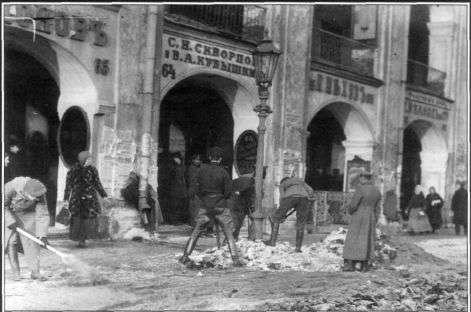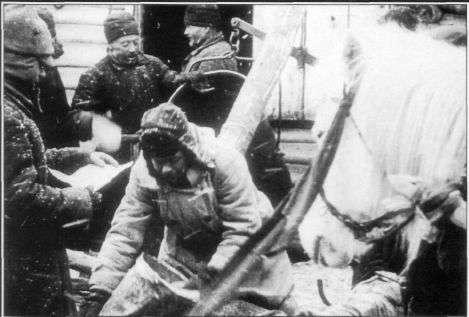A People's Tragedy (140 page)
Read A People's Tragedy Online
Authors: Orlando Figes

Moscow's first with its border states — on 2 February 1920.36
To honour Trotsky's role in the defence of Petrograd, he was awarded the Order of the Red Banner, the first such order of its kind. Trotsky attained the EVERYDAY LIFE UNDER THE BOLSHEVIKS
81-2 The fuel crisis in the cities.
Above:
Muscovites dismantle a town house for firewood.
Below:
a priest is commandeered to help transport timber. Many horses died for lack of food so human draught was used.


83-4 Selling to eat.
Above:
women of the 'former classes' sell their last possessions on the streets of Moscow.
Below,
a soldier buys a pair of shoes from a group of
burzhooi
fallen on hard times.


85-6 Selling to eat.
Above:
a low-level party functionary haggles over a fur scarf with a female trader at the Smolensk market, Moscow, 1920. The woman on the left has the appearance of a
burzhooika. Below:
traders at the Smolensk market, Moscow, 1920.
The woman with the string bag and the loaf of bread is almost certainly a prostitute.


87 Putting the gentle classes to work. Two ex-tsarist officers are made to clear the streets under the inspection of a commissar with guards, the Apraksin market in Petrograd, 1918. The main purpose of this sort of forced labour was to humiliate and degrade the privileged classes of the old regime.


88 The Bolshevik war against the market. Cheka soldiers close down traders' stalls on the Okhotnyi Riad (Hunters' Row) in Moscow, May 1919.
89 Requisitioning the peasants' grain.


90 'Bagmen' travelled to and from the countryside exchanging food for manufactured goods. The result was chaos on the railways.
91 The 1 May
subbotnik
('volunteer' labour on Saturday) on Red Square in Moscow, 1920.


92 By 1920 the state was feeding - or rather underfeeding - thirty million people in makeshift cafeterias like this one at the Kiev Station in Moscow.
93 The new ruling class: delegates of the Ninth All-Russian Party Congress, Moscow, 1920.

